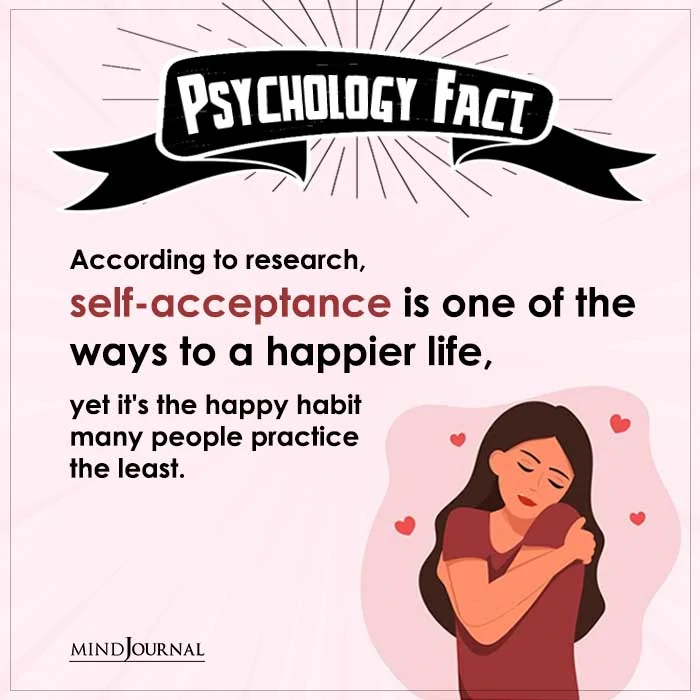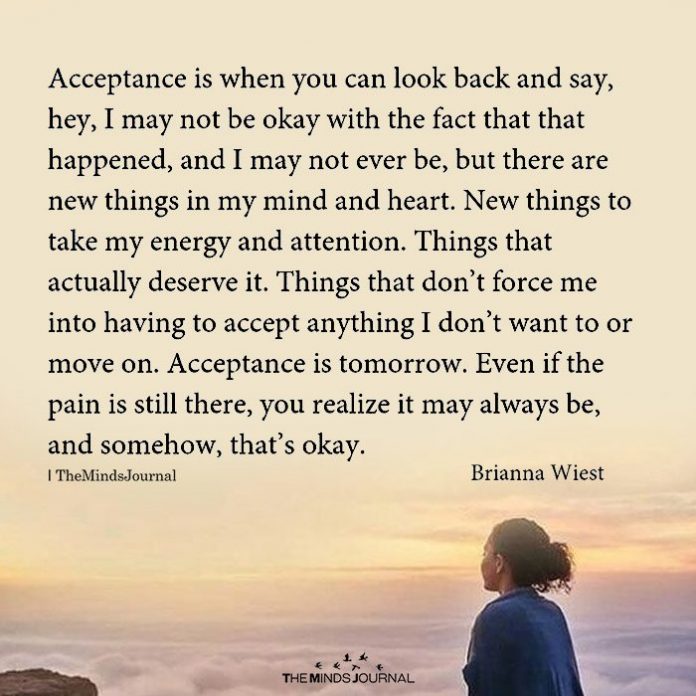Do you want to live a meaningful life? Then you need to master the art of acceptance. When you practice acceptance, it means that you’re respecting the process and your current place in life.
There are only a few skills in life as important as the skill of acceptance. Whether it comes to your mental health, the quality of your relationships, your physical fitness, your career success, or your expertise in playing any instrument on the planet… all of it (and much more) depends on your ability to feel uncomfortable while doing the things that matter.
If you wish to feel strong and healthy, you have to eat your greens – even though you might rather want to try out that new burger place. If you want a loving relationship with your spouse, you have to focus on being kind and attentive – especially when you would rather just want to scream and shout.
Simply said, acceptance is the ability to feel the full range of your thoughts and emotions without needless avoidance or clinging in the service of what matters the most to you.

This is often easier said than done. But just like any other skill, you can get better at it with practice. Think of it like exercise. As a part of your workout, you might practice stretching – not because life regularly asks you to touch your toes, but because it might ask you to pick up the newspaper from the driveway, or pull that clump of dog hair off the carpet.
Similarly, you might practice movements while standing on a balancing board – not because life itself regularly asks you to do movements while standing atop an unstable base, but because it might ask you to reach the top shelf on your tippy toes, or to walk across an icy parking lot without falling down and hurting yourself.
During your workout, you practice movements that don’t really matter in that specific moment. However, by practicing these movements when they don’t matter, you will have them in your skill-set when they DO matter.
In precisely the same way, it helps to practice acceptance when it doesn’t matter, so you have the skill when it DOES matter. In other words, you want to work on acceptance when you are NOT particularly sad, anxious, lonely, ashamed, angry, or stressed, so you can apply the skill when you DO feel any or all of those things.
Related: What Is Contentment and Why Is It Essential For Happiness? 5 Benefits
Art of Acceptance: Deliberately practice acceptance in small emotional stretches.
Let me give you an example from my own life.
I’ve just turned 73, and my youngest son is about to turn 16. I have three other children, from almost 52 to just-turned 33, so I know what 16 means. It means driving instead of being driven, dramatically reducing the time we can talk to each other with nothing else to do.
And it means his friends will be vastly more a focus than his Mom and Dad, and we will be less and less cool. He chuckled a bit at me last night as we watched my beloved football team, the Nevada Wolfpack, and I talked about a Nevada player who narrowly avoided being a goat for dropping two critical passes earlier in the game by redeeming himself with a good catch in a critical drive. “Goat?” he snorted. “Goat,” it turns out, is young people’s sports talk for Greatest Of All Time – Who knew? Tom Brady is the goat!.
16 means leaving home and growing up. It means separation and individuation. It’s long been underway — but now it got real.
There is such a bittersweet mix of emotions in watching as my last child approaches adulthood. But how can I accept these feelings?
One thing I’ve done deliberately in the last week, I’ve listened to Neil Young’s “Sugar Mountain” about 15 times. The song was written as he was leaving his teenage years and realizing that his childhood was behind him now. The lyrics speak of the bittersweet thought that you are leaving too soon.
The song has us remembering the excitement we had as kids during noisy county fairs, when all our friends were there. And you can taste the cotton candy again you had with Mom and Dad. But yet you know with sadness and a sense of loss that it’s time to leave that place with its “barkers and the colored balloons”, and you are a bit surprised at what you feel when you know leaving it is real.
If you haven’t listened to this song for a long while (or ever), crank it up and see if you can touch your own sense of loss of innocence. I wept on the first listening and on the fifth. I tried to tell my wife about it and could barely make words come out of my mouth. She patted me kindly. Then I listened a few more times and noticed feelings I hadn’t noticed before.
Appreciation. Purpose. Pride about my son’s growth. Love. I started singing it in the car. I later played it for my wife and we talked about our beautiful boy and his challenges and how we can be better parents to our son in this phase of his life.
This is acceptance work. It’s about scooping out a place that love and purpose can fill.

If you are having a hard time with acceptance work, consider the possibility of creating problems for yourself, just as you do in the gym. In fact you can start in the gym! As you practice on the balance board, deliberately imagine staying balanced at work as you receive demands and criticisms. As you assume a difficult Yoga posture, allow an emotional pain to come to mind that you sense you can safely lean into, and let your posture deepen your contact with it.
Outside the gym go find that picture of a loved one who has passed away and remember your feelings about that person on purpose. Write that poem about what it is like to be you. Call that friend you rarely talk to and lean in a bit more in appreciating the friendship. Acceptance is about allowing the full range of your thoughts and emotions while pursuing what is purposeful and meaningful to you.
Related: How Accepting Things You Cannot Change Makes You Finally Free To Be Yourself
The time to start working on acceptance skills is before you really need them. The time to start working on acceptance skills is now – before the icy patch on the driveway. See if that gives you a way forward.
So did you find this inspiring? Share your thoughts with us in the comments below!
Written by: Steven C. Hayes Originally appeared on: stevenchayes.com Republished with permission









Leave a Reply
You must be logged in to post a comment.